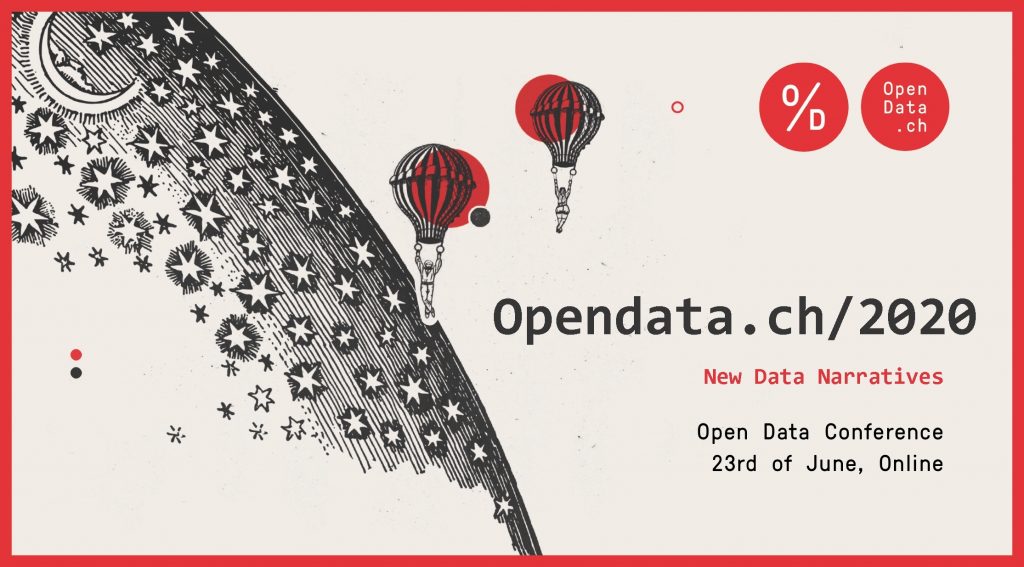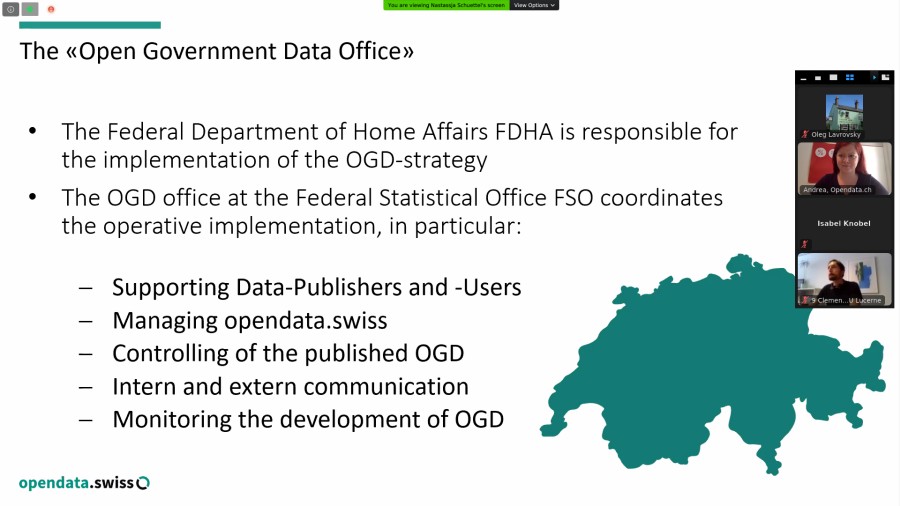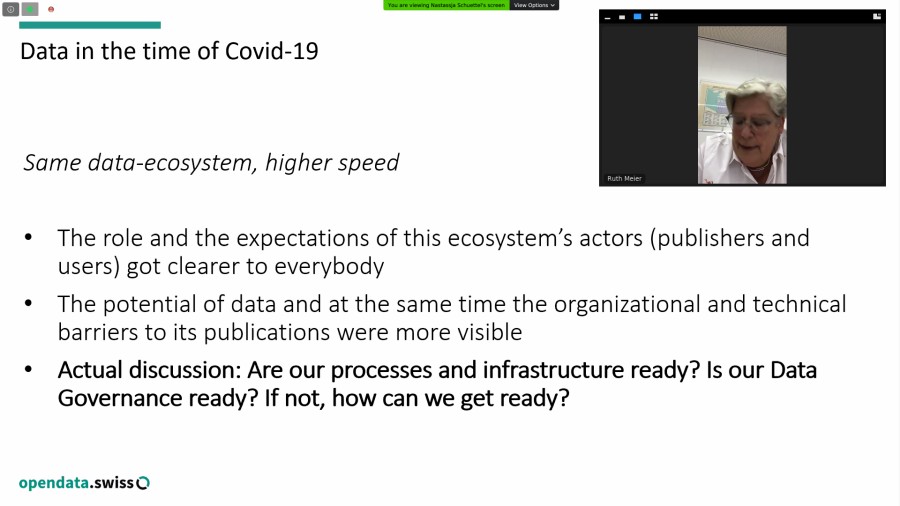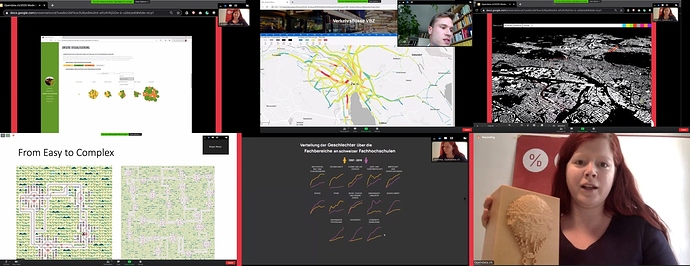Notes on all sessions are linked at the post From Data Visions to Action Points (opendata.ch).
Some additional impressions from yesterday’s online Forum:

„Citizen Generated Data would need to be used to grasp the new normal.“ – presiding the association and bringing together a lot of loose threads, Andreas Kellerhals opens the Forum with a forward looking speech. This excerpt reflecting the interest in CDG outlined in an earlier proposal.

„Our vision is that Wikimedia will provide essential infrastructure for free knowledge“ … „If we better want to understand our impact, we need to better understand how data is used and misused … including the potential [of scams, fake news, etc.] for harm.“ In a superb keynote, the recently instantiated president of Wikimedia Switzerland Muriel Staub summarizes the new vision of Wikimedia - see https://2030.wikimedia.org

„We are fighting for a fair, free and open future - and in that fight, we are making progress.“ – Hannes Gassert’s full speech was shared previously on this thread and in his blog.

„Let’s go for a critical and constructive elaboration of the kind of data society we want to live in“ – Maud Châtelet, who has been running Hackdays and developing projects in the association, kicked off the interactive part of the event with an overview of how the Data Visions workshops will run. Based in part on themes of last year’s unconference and crowdsourced submissions, in this „collaborative decision framework“ we sought to connect diverse responses to key questions with action points for the community.
Here are the 7 sessions that took place, with their facilitators:
| Title |
Summary |
Filling Female Data Gaps
Nikki Böhler
|
A world where data is available without gender bias and gaps |
Research Data Connectome
Sebastian Sigloch
|
To connect and organize (meta)data for research sustainably across disciplines, in order to make it widely accessible, interoperable and valuable. |
Serving, not Spying
Maud Châtelet
|
In ten years from now, I don’t feel observed and manipulated through the Data being collected about me but i can rely on being served by data for better services, better policies and a better environment. |
Better use of data in Switzerland
André Golliez
|
Public and private sector data is open, shared, and used for public and private good within a trustworthy data ecosystem ("Swiss / European DataSpace“). |
Better use of data in Switzerland
Florian Wieser
|
Public and private sector data is open, shared, and used for public and private good within a trustworthy data ecosystem ("Swiss / European DataSpace“). |
Solid basis for committed debate and innovation
Andreas Kellerhals
|
Data create a critically discussable basis for political analysis and joint shaping of our future just as they enable innovations in everyday life - free access and responsible use are indispensable for an enlightened information society. |
Open decentralized data storage
Lukas Hess
|
Data is a new form of currency: It is too powerful to be controlled by centralized private entities - let’s build a decentralized system to store, share and use data. |
Shared ecosystem of energy data in Switzerland
Emilie Boillat
|
Data about energy production and consumption is shared openly by Swiss utility companies, promoting open innovation and helping to reach the „Agenda 2030“ climate goals. |
Summaries are linked to this post. Here is a glimpse of how those workshops ran, with a shared document in which we collaborated on compiling futuristic outlooks, situational analysis, and pragmatic recommendations:

In the afternoon keynote, we heard an update from Ruth Meier from the Federal Statistical Office about Switzerland’s current Open Government Strategy. These were stories from the front lines of data publication, the stunned silence after the rapid sharing of information followed by a peppering of questions from our audience. I thought this was the highlight of the conference.
But then I was blown away, again, by the  Open Data Student Award nominees. One after another, the projects and presentations were an array of inspiring results. I’ve already reviewed them several times with delight, and look forward to putting up a proper showcase.
Open Data Student Award nominees. One after another, the projects and presentations were an array of inspiring results. I’ve already reviewed them several times with delight, and look forward to putting up a proper showcase.
Our sincere congratulations to Ueli, Anian, Janik, and Severin, students at the ETH and winners of the 2020 Student Award with their visualization of @vbz_zueri_linie public transport flows via @OpenDataZurich.
Closing thoughts and the gritty challenges ahead were offered by data journalist Nikolai Thelitz, who spoke of the monumental efforts that have gone into aggregating usable Covid-19 Case Data, though the larger issues and learnings from this still-evolving crisis will probably be only visible clearly at Opendata.ch/2021.
Thank you all  and in particular, the production team at our association and all the attendees making this year’s event a milestone occasion, in the middle of a difficult, testing, seminal year. The complete outputs, results of our Action Points voting, award nominees, etc., will be available soon. We made progress.
and in particular, the production team at our association and all the attendees making this year’s event a milestone occasion, in the middle of a difficult, testing, seminal year. The complete outputs, results of our Action Points voting, award nominees, etc., will be available soon. We made progress.  Onwards and upwards!
Onwards and upwards!



 Open Data Student Award nominees. One after another, the projects and presentations were an array of inspiring results. I’ve already reviewed them several times with delight, and look forward to putting up a proper showcase.
Open Data Student Award nominees. One after another, the projects and presentations were an array of inspiring results. I’ve already reviewed them several times with delight, and look forward to putting up a proper showcase.
 and in particular, the production team at our association and all the attendees making this year’s event a milestone occasion, in the middle of a difficult, testing, seminal year. The complete outputs, results of our Action Points voting, award nominees, etc., will be available soon. We made progress.
and in particular, the production team at our association and all the attendees making this year’s event a milestone occasion, in the middle of a difficult, testing, seminal year. The complete outputs, results of our Action Points voting, award nominees, etc., will be available soon. We made progress.  Onwards and upwards!
Onwards and upwards!